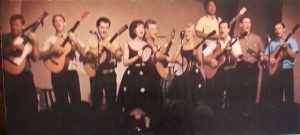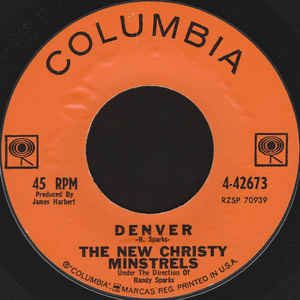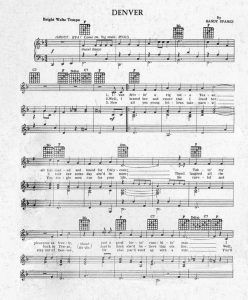Before the Beatles emerged as pop’s dominant power, Denver was a bastion of slick, commercial folk-pop—the soul and inspiration for groups like the New Christy Minstrels.
Randy Sparks founded the New Christy Minstrels in 1961. The act was unlike any group on the folk scene, starting out as a 14-member ensemble of singers and instrumentalists. Named after E. P. Christy’s minstrel troupe of the 1800s (which introduced many Stephen Foster songs), the New Christy Minstrels were a barrage of color-coordinated blazers, starched petticoats, choreographed grins and stage makeup.
Their success was immediate. Lined up across the stage, the group was a spectrum of ten colorful personalities. The arrangements creatively spotlighted the players in various “step outs” as duos, trios and soloists.
“Everybody sang. Everybody played,” the Kansas-born Sparks said. It was an idea many inside and outside the group thought was crazy. They were successful because their big sound was refreshing at the time and because members contributed original material. Their Top 40 hits were “Green Green,” “Saturday Night” and “Today.”
“Denver”—the first single from the New Christy Minstrels’ second album, In Person, recorded live at the Troubadour in Los Angeles circa September 1962—was bubbling under the Billboard Hot 100 in March 1963, at No. 127. But it was No. 1 on Denver’s KIMN radio station for three weeks.
“It was one of our first records, and it immediately became a big hit in Denver,” Sparks said. “I was really the man in Denver. They played everything that I put out. My phone rang constantly—’Will you come to Denver?’ The Back Porch Majority (a sort of farm club for the group) was huge there—I put them in Taylor’s Supper Club. It was a love affair.”
Sparks successfully used the traditional melody “Old Rosin the Beau” for “Denver.” “It probably came out of the music halls of Ireland or England,” he said. “It’s part of our heritage. We all own it together.” His reasoning was simple: “If you did not have music that was old, nobody wanted to hear it in the folk tradition. If you wrote a new song, people were suspect of what you were doing and they rejected it out of hand. Very few new songs made it in. I looked at it very logically. ‘Okay, we’ll play a little game with them. I’ll snag a public domain melody, people know they’ve heard it before, so they’ll accept it. And I’ll put new words to it and I won’t violate any tradition. I’ll make it chronologically correct.’
“At the time, one of the top songs in the country was ‘Kansas City.’ I said, ‘That’s neat, you can write a song about any location and it will become successful there, and if you’re good enough with it, it’ll spread.’ I started looking at the map for places I could write about. ‘Denver’ was an instant thing: ‘Driving a rig out of Texas, full loaded and bound for Cheyenne.’ I couldn’t violate the timeline—it had to be as possible in 1880 as it was in 1960. And it worked. It was a good, up-tempo song, with Barry McGuire doing the ‘Yeah!’s. It was a smash, but only in a few places.”
The New Christy Minstrels radiated a contagious spirit that charmed their audience and the show-biz press alike. Andy Williams booked the Grammy-winning group for his television show throughout the 1962-1963 season, and in 1964, the ensemble hosted its own summer television series.
The New Christy Minstrels provided an early training ground for Kenny Rogers & the First Edition, some members of the Association, actress Karen Black, future Byrd Gene Clark and Kim Carnes, as well as John Denver.
“I was the one who changed his name, and he fought it all the way,” Sparks said. “He wasn’t named after the city, or after his love for the Rocky Mountains. He was named after my song ‘Denver.’
“This corny new kid named Little Johnny Deutschendorf came into my place. I said, ‘I don’t have room to put that on my marquee.’ He said, ‘Well, I’m not changing my name—I love my father, and he’d be really disappointed in me if I did.’ I said, ‘You’d better get used to it, because you can’t market yourself with the name Little Johnny Deutschendorf.’ You had to have a handle that people could spell and pronounce. I said, ‘I’ll give you a job beginning this weekend, but I need another name from you.’ I gave him three days to think of one.
“Mike Crowley, a Back Porch Majority man, said to John, ‘Let me give you a piece of advice that worked for me—if you keep the same initials, you won’t have to buy new luggage.’ So we were all looking for a name beginning with ‘D.’ ‘Denver’ was the first song I had sheet music done for. I had a piece of it above my desk. I looked up and said, ‘What about John Denver?’ He said, ‘No, it’s too close to Bob Denver (known to many as the title character on television’s Gilligan’s Island; he also played beatnik Maynard G. Krebs on The Many Loves of Dobie Gillis from 1959 to 1963).’ I said, ‘Young man, if you play your cards right, nobody will remember Bob Denver.’ And that’s the way it worked out.”
After the New Christy Minstrels, Sparks spent the next three decades with folk icon Burl Ives, as well as having his hands in a variety of businesses both in and out of the entertainment arena.




